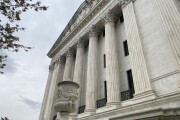- Key Insight: All eyes are on the Slaughter v. Trump case, which will be heard by the Supreme Court at the end of the year. How that case plays out could decide whether Federal Reserve Governor Lisa Cook can remain at the central bank.
- Expert Quote: "If they overturn Humphrey's Executor and do so in a way that leaves no carveouts — and they say nothing about the Fed — then Cook's case could effectively be determined." — Fordham University Law Professor Jane Manners
- What's at stake: Legal observers expect the Supreme Court to overturn Humprey's Executor via the Slaughter v. Trump case, which could give the president greater leeway of firing members at independent agencies. Whether or not the Federal Reserve receives special treatment could have profound implications on both Cook and the central bank.
As the Supreme Court mulls an appeal in a case concerning the president's ability to fire sitting members of the Federal Reserve Board of Governors, many legal scholars say the outcome will likely depend, at least in part, on the results of other pending cases.
Beyond Cook's case, several other legal challenges to the Trump administration's removal of federal employees are pending, including
The FTC case, Slaughter v. Trump, is scheduled to be heard by the Supreme Court in December. Legal experts say it could potentially overturn Humphrey's Executor v. United States, a 1935 precedent that set limits on the president's authority to remove officials from independent agencies. How the court might choose to overturn or revise that standard could have sweeping implications for the Federal Reserve's independence from political influence.
Some legal experts suggest Cook's case, which challenges President Donald Trump's attempt to
Scott Alvarez, adjunct professor at Georgetown University Law and former general counsel at the Federal Reserve, believes such consolidation could help the justices avoid conflicting rulings.
"The justices appear to want to reject [Humprey's Executor] and say the Constitution doesn't allow it," Alvarez theorized. "But if they do that in a single case, they'd also have to separately explain how the Federal Reserve fits into that framework. Why not hear all the cases together and address the Fed at the same time — either by saying it's different, or it isn't. That way, they can issue one comprehensive decision instead of multiple rulings that could end up conflicting with each other."
Even if Cook's litigation isn't combined, the outcome of the Slaughter suit and the scope of the Supreme Court's decision can still shape her future on the board, and by extension, the Fed's independence.
Jane Manners, a law professor at Fordham University, said it's unclear whether the Supreme Court would carve out exceptions in a ruling that strikes down Humprey's Executor. If there are none, "then Cook's case would be effectively determined."
"It's an open question," she said. "If they overturn Humphrey's Executor and do so in a way that leaves no carve-outs — and they say nothing about the Fed — then Cook's case could effectively be determined. Or they could explicitly articulate a carve-out for the Fed, which could resolve her case. Or they could gesturally limit the scope of their decision, leaving the Cook question for another day." For now, the court must decide whether to uphold a
Most recently, Trump's legal team
Richard Horn, co-founder of Garris Horn LLP and former counsel at the Consumer Financial Protection Bureau, said the court might acknowledge the Fed's unique role even if it narrows Humphrey's Executor.
"The Supreme Court, even if it strikes the 'for cause' provisions of other agencies, could potentially decide that the principles in Humphrey's Executor apply in a special way to the Federal Reserve, because of the Federal Reserve's unique role in the economy," said Horn.
Alvarez added that the justices are expected to make a decision regarding the temporary injunction, though a full hearing on the merits may follow.
"The Supreme Court will have to make a decision on whether to keep the preliminary injunction in place that allows Lisa Cook to keep her job at the Fed, so it's not a decision on the merits," added Alvarez. "I would expect that they will schedule it for a decision on the merits as well sometime in the near future, but we'll see what happens there."
Patrick Harker, former president of the Philadelphia Federal Reserve, said he cannot predict what the court is going to do. But if it sides with Trump and allows him to remove Cook, the consequences could be profound.
"If they go down the path of allowing the president to remove Governor Cook, then really there's no more independence of the Federal Reserve," he said. "In terms of the governors, the seven governors, what would stop a president from just removing all of them at once and just replacing them with people who go along with what the president wants?" Harker, who led the
"If changes need to be made, then your legislative branch should make them," Harker said. "Let the people's house, the Congress, decide if they want change. They created the Fed, so they could change it, but I think it's got to be [done by Congress,] as opposed to one individual or even a court."







